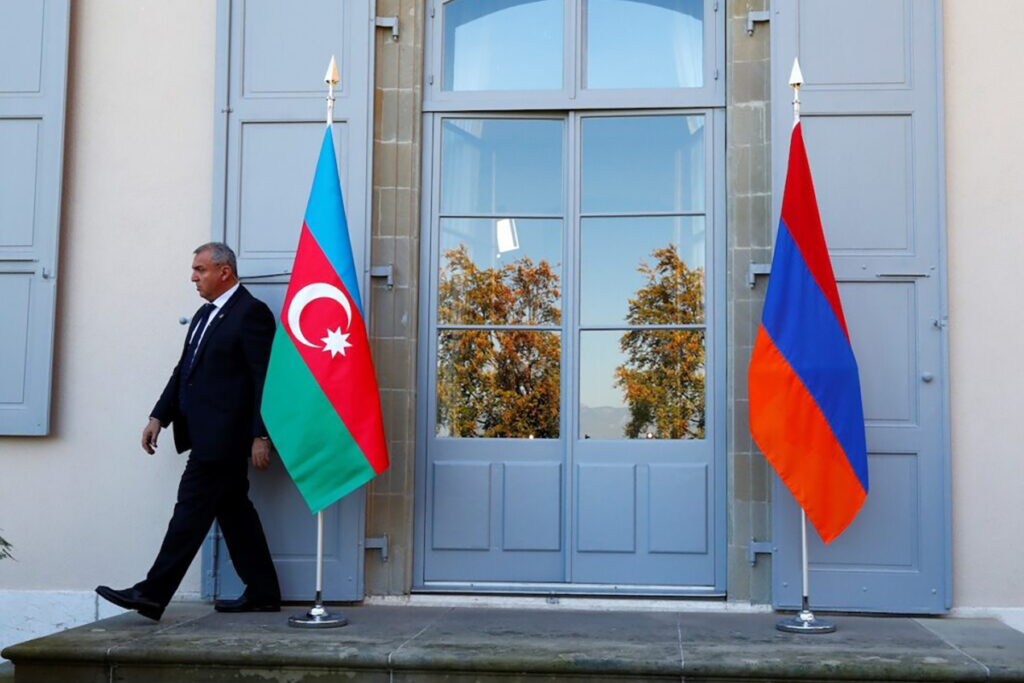Russian Foreign Minister Sergey Lavrov has announced that the Collective Security Treaty Organisation (CSTO) is ready to send observers to the Armenia–Azerbaijan border, just as the EU approved their own observer mission that was agreed earlier.
The EU mission was agreed to at a meeting between Azerbaijan’s President Ilham Aliyev, Armenia’s Prime Minister Nikol Pashinyan, EU Council President Charles Michel, and France’s President Emmanuel Macron on 6 October.
Speaking with Armenian Foreign Minister Ararat Mirzoyan on Wednesday, Lavrov said that the observers could be deployed to the Armenian side of the border with the agreement of the six heads of state of the Russian-led security alliance, according to Russian state news agency TASS.
He said this had been recommended by a CSTO fact-finding mission sent to Armenia after the country appealed under the treaty’s mutual defence clause during attacks by Azerbaijan on 13–14 September.
‘They went there, brought recommendations, these recommendations have been in our hands for more than a month’, Lavrov said.
The refusal of Russia and the CSTO to militarily aid Armenia was met with widespread consternation in the country.
[Read on OC Media: Opinion | Russia’s shifting interests are leaving Armenia out to dry]
In a statement from the Armenian Foreign Ministry about the meeting with Lavrov, no mention of a CSTO mission were made.
The ministry said that ‘problems related to the implementation of international mechanisms for monitoring and controlling the border situation were addressed’.
Mirzoyan reportedly stressed that ‘the Armenian side expects an unequivocal position and support from Russia as a strategic ally in withdrawing the Azerbaijani armed forces from the sovereign territory of the Republic of Armenia’.
Rival observer missions
Lavrov’s announcement came a day after Russian Foreign Ministry spokesperson Maria Zakharova criticised an agreement to deploy EU observers along the border, which she said was an attempt to push back Moscow’s efforts and intervene in the normalisation of relations between Yerevan and Baku.
‘The only key to reconciliation between Baku and Yerevan and the establishment of lasting peace and long-term stability in the region is the full implementation of the tripartite statements of the leaders of Russia, Azerbaijan, and Armenia’, TASS cited Zakharova as saying, referring to the agreement that brought an end to the Second Nagorno-Karabakh War.
On Tuesday, the French Foreign Minister, Catherine Colonna, announced that the EU’s Political and Security Committee had approved the deployment of an EU civilian observer mission to monitor the Armenian-Azerbaijani border.

The mission was set to be deployed for a maximum of two months and would be stationed on the Armenian side of the border.
Azerbaijan, who agreed to ‘cooperate with the [EU] mission as far as it is concerned’, has not yet commented on Lavrov’s proposal.
The foreign ministers of Armenia, Azerbaijan, and Russia are set to meet ‘on Russia’s initiative’ on the sidelines of the Council of Foreign Ministers of the CIS in Astana on Friday, Armenia has reported.
The diplomatic push by the EU came three weeks after a two-day war between Armenia and Azerbaijan, the largest escalation since the 2020 war. In recent days, Armenia and Azerbaijan have both repeatedly accused each other of ceasefire violations.
RFE/RL has reported, citing diplomatic sources, that the EU mission would consist of up to 50 members.
‘The goal of this mission is to stabilise the situation and to initiate a process between the parties. In particular, we hope that this mission can contribute to the upcoming border delimitation process in the coming days’, said Colonna.
‘At the same time, we are working on the establishment of an OSCE fact-finding mission to provide an objective view of the situation and needs, in particular humanitarian needs, following the clashes’.
Colonna also said that France ‘stands in solidarity’ with Armenia.
Speaking in the European Parliament on Monday, the EU’s Special Envoy to the South Caucasus, Toivo Klaar, stressed the importance of the full backing of the 27-nation bloc’s legislature and member states for the mission.
[Read more: EU observer mission agreed as Pashinyan and Aliyev meet in Prague]




 12 October 2022
12 October 2022



